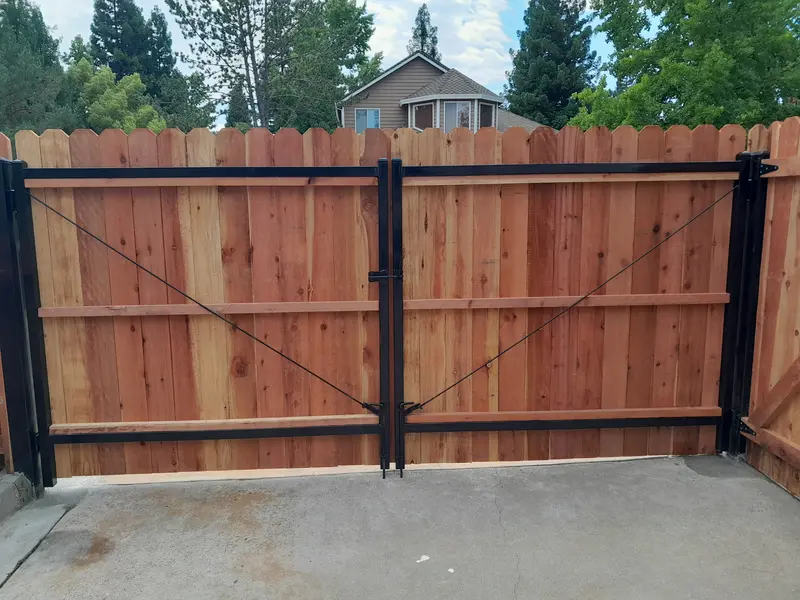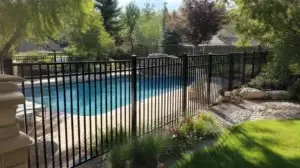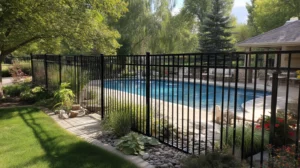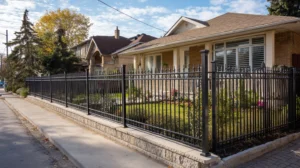When installing a gate as part of your new fence, one important consideration is which material to use for the gate’s frame – welded steel (best), wood (standard) adjustable metal DIY frame (NOT recommended). Both steel and wood have their own sets of pros and cons when used for fence gates. Understanding these can help guide you in selecting the right material for your particular needs.
Welded Steel Gate Frames -Advantages
- Strength & Durability – Steel framed wood gates offer a stronger, more reliable solution compared to standard wood framed gates, which eventually sag over time as the wood shrinks and dries out. They eliminate the sagging issue.
- Wider Gates – Welded steel frames allow for much wider gates to be built without sagging up to 10′ single gates. These rigid frames in addition to more heavy-duty hinge options like barrel hinges will give more width options for your upcoming gate installation.
- Low Maintenance – Other than occasionally cleaning or repainting it, a steel gate requires very little ongoing maintenance compared to a wood version. Steel won’t rot, crack and splinter like wood can over time.
- Customizable Style – Steel fence gates can be crafted into nearly any design, from simple to elegant. They can also be matched to complement other metal fences and hardware around your property.
Welded Steel Gate Frames -Disadvantages
- Higher Upfront Cost – Steel gates typically cost significantly more upfront than wood gates, sometimes 2-3 times more. The future savings from their long lifespan and low maintenance partially offset this over time.
- Feel/Appearance – The black steel frame is normally only visible from the backside of the fence (not from the front), so most customers do not have any issue with seeing the black metal frame but it will a contract in color to all the wood around it.
Wood Gate Frames -Advantages
In contrast to steel, wood fence gates have their own pros and cons:
- Lower Upfront Cost – Wood gates can usually be purchased and installed at a fraction of the cost of steel. This makes them appealing for homeowners on stricter budgets.
- Aesthetic Versatility – Available in diverse styles and stains/finishes, wood can complement almost any fence or landscaping design theme. The natural beauty of real wood appeals to many homeowners.
- Ease of Repair – Compared to metal gates, a wood gate is simpler for the average homeowner to repair or replace boards and hardware themselves if components get damaged or wear out over time.
Wood Gate Frames -Disadvantages
- Warping/Sagging – When exposed to enough weather and use over 5-10 years, wood gates often begin sagging or warping in shape. At this point they become eyesores and often stop functioning properly.
- Ongoing Maintenance – To maximize lifespan, wood gates require far more periodic maintenance like sealing, staining, hinge tightening, etc than a steel version would. Even with diligent upkeep they still degrade faster than steel overall.
Adjustable Metal Gate Kits- NOT recommended
- The adjustable DIY gate kits use thinner metal and looser fittings to allow for adjustability but this compromises the overall strength of the gate kit.
- The adjustable kits only can accommodate a certain range of gate widths, whereas a professional steel frame can be constructed to any custom width. This limits gate sizing.
- Insufficient support for larger/wider gates- Their lighter metal and construction may not properly support heavy use or wind/environmental factors on larger gate spans.
- Need for supplemental wood framework: Most DIY kits require adding supplemental wood framing for attachment, defeating some of the purpose of using steel to prevent wood warping and rotting over time.
- Not recommended for long term durability: As the goal of steel framing is to create a gate that won’t sag or need adjustments for 20+ years, the DIY kits likely won’t stand up for that length of time without needing reinforcements or full replacement.
Bottom Line – Steel Gate Frames is the Clear winner for many!
When selecting a fence gate, consider how important upfront cost vs long term durability and low maintenance is to you.
Steel framed wood gates are the strongest and longest lasting type of gates for wood fences. By choosing a steel frame you will not need to worry about gates issues created by warping, twisting or sagging. These metal frame gates require very little maintenance or adjustment over the lifetime of the fence.
Steel framed double gates allow for wider gate openings. Such as double wide driveway gate and dumpster enclosure gates.
But if you want something cheaper that complements your fence style adequately for 5-10 years, wood is likely the more budget-friendly path to take.
As with most home improvement projects, your needs and preferences should drive the decision between these two quality materials for fence gates.




